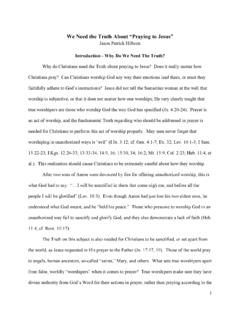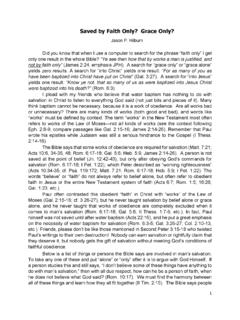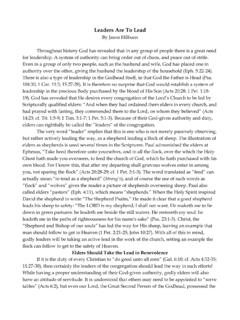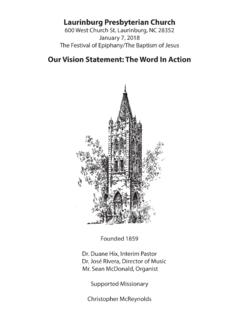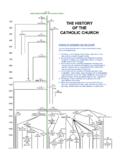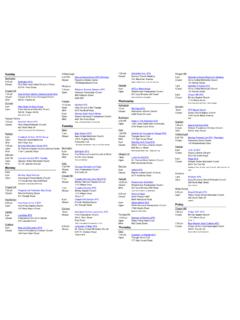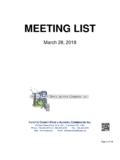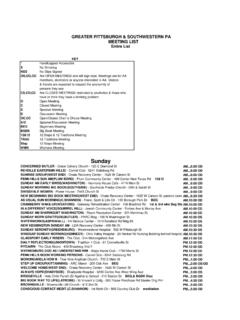Transcription of A Conversation With a Presbyterian Preacher
1 A Conversation with a Presbyterian Preacher Jason Hilburn Two preachers from the same area met recently for a Biblical discussion. One was a member of the church of Christ (real names will not be used; he will be called Mr. Chism in this article), and the other Preacher was a member of the Presbyterian denomination (he will be called Mr. Prescott ). The two men had a cordial religious discussion about several religious subjects. In writing some of the details of this Conversation , it is not the intention of this writer to mock Mr.
2 Prescott, who is loved and respected as a person made in the image of God. This is also not intended to mock people who are members of the Presbyterian denomination. The purpose of this article is to use this real life discussion to help people see the difference between Truth and error. Mr. Prescott began the Conversation by telling Mr. Chism that he is a part of the more conservative group of Presbyterians. He made it clear that He believes the Bible is the Word of God, and that it should be followed. He said that practices such as ordaining women as preachers over men are forbidden by the Scriptures.
3 Mr. Chism agreed, citing passages such as 1 Timothy 2:11-12 and 2 Timothy 3:16-17, and expressing that it was good that Mr. Prescott had a respect for Biblical authority. Mr. Prescott went on to say that men should go back to the ideas of the Reformation, when people like Martin Luther and others were seeking Truth. Mr. Chism agreed that men should seek Truth, but maintained that men should go back farther than the Reformation. He stated that men should go all the way back to the time of the apostles, to the days of the early church , for the restoration of pure New Testament Christianity and the one true church that Christ built (Matt.)
4 16:18; Acts 2:42; 20:28; 2 Thess. 2:15). Mr. Chism explained that the Bible speaks of the universal church that Christ built (Matt. 16:18), and the local churches of Christ which make up that one universal body of the saved (Rom. 16:16; Eph. 4:4; 5:23). However, there is no Biblical authority for the universal church to be divided up into sections larger than the local congregation. Denominations are smaller than the universal church and larger than the local church , and they do not fit in to God s design for the church .
5 They are actually contrary to what God has authorized. Mr. Prescott listened intently to the reasoning of Mr. Chism from the Scriptures and did not disagree. When discussing causes of divisions, Mr. Chism reasoned with Mr. Prescott and questioned him regarding passages such as 1 Peter 4:11, 16 and 1 Corinthians 1:10-13. Mr. Prescott conceded that party names such as the Presbyterians, the Methodists, the Baptists, the Lutherans, and other names not found in the Bible cause and promote divisions, and should not be used. He agreed that men should all speak as the oracles of God as God commands, giving God glory through Jesus Christ.
6 Mr. Chism explained to him that this is what the churches of Christ do (Matt. 16:18; Acts 11:26; 20:28; 26:28; Rom. 16:16; 1 Pet. 4:16). Mr. Prescott could not disagree that such was the right course of action. Mr. Prescott said he works together with various denominations, and he asked Mr. Chism what he believes about cooperation with various denominations. Mr. Chism stated that just one clear departure from the Scriptures will cause a person to be lost (1 Cor. 5; Gal. 1:6-9; 5:1-4; 6:1; 1 Tim. 4:16; 2 Tim. 2:15-18), and if someone is in error, the one who bids him Godspeed is also in error (2 John 9-11).
7 Therefore, Mr. Chism said he could not bid Godspeed to anyone who is teaching something contrary to what the Bible clearly teaches. Mr. Chism reminded Mr. Prescott that Mr. Prescott takes a firm stand against women in the pulpit, because Mr. Prescott obviously views that as a clear teaching from the Scriptures. Mr. Prescott could see the point. Mr. Prescott asked how the churches of Christ make decisions. He explained that in the PCA ( Presbyterian church in America) they have groups of men called presbyteries who oversee regions consisting of multiple congregations.
8 They also have a local group of men in each congregation called the session. Mr. Chism asked if the regional presbytery makes decisions for the local congregations. Mr. Prescott hesitated at first, but then said, Yes. He said that regarding a decision such as hiring a teaching pastor, the leaders of the local congregation (the session) would decide who they wanted to hire, and then they would submit this to the regional presbytery for the final decision to be made. Mr. Chism explained that the churches of Christ are able to be united because they simply do what the Bible says.
9 The Bible records each local congregation having a multiplicity of qualified men appointed as leaders overseeing the congregation. These men are called elders most often in the New Testament, and one local congregation was the extent of their rule (Acts 14:23; 20:17, 28; 1 Tim. 3:1-7; Titus 1:5-9; Heb. 13:7, 17; 1 Pet. 5:1-4). Mr. Chism further reasoned that an evangelist is different from a pastor (Eph. 4:11), and that there is no authority for a regional presbytery (eldership). He further explained that these kinds of departures are basically how the early church got away from the New Testament pattern for organization, leading to the Catholic church s unscriptural hierarchy.
10 Mr. Prescott could not show Scriptures authorizing the organization of the PCA, and he could not disagree with Mr. Chism. Mr. Prescott conceded that everything Mr. Chism had said up to this point was straight from the Bible and true, but he then asked what Mr. Chism believed regarding how one can be saved. He said that this subject would probably be where the two would disagree. Mr. Chism stated that people are not saved at the point of belief, because there are people who believed in Christ, but were still lost (citing passages such as John 8:30-44; 12:42-43; Matthew 7:21-23; James 2:14-26).
